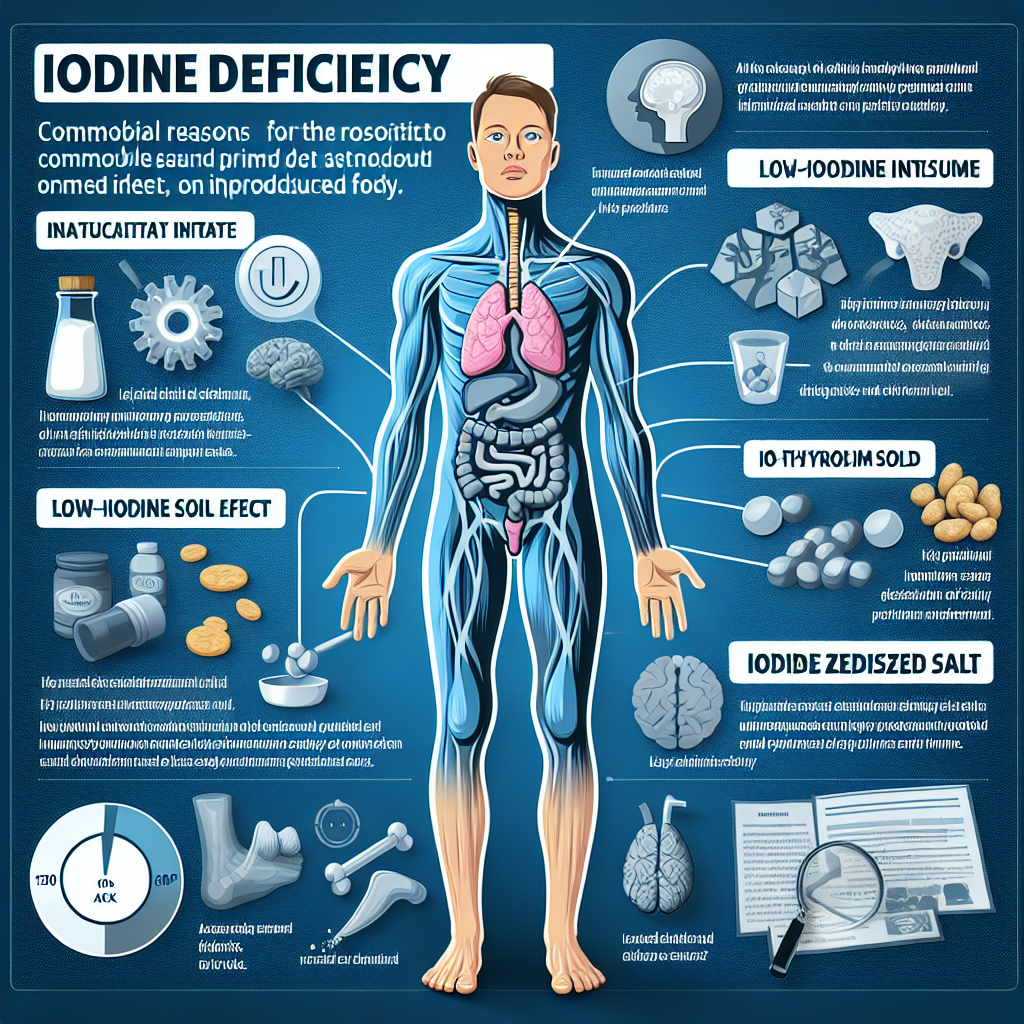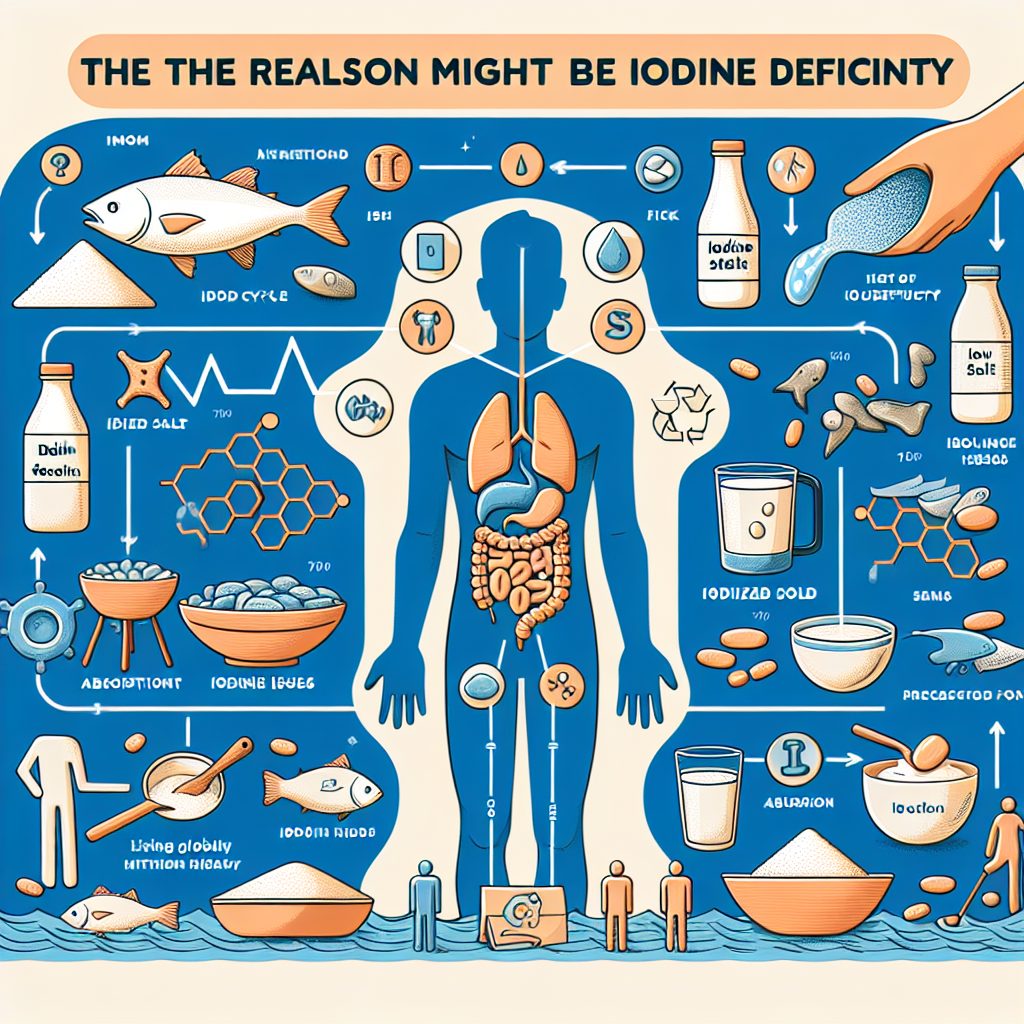The Real Reason You Might Be Iodine Deficient

Discover the real reason you might be iodine deficient. Uncover the truth and learn how to improve your health today. Click here to find out more.
Understanding the Causes of Iodine Deficiency: A Deep Dive
Iodine deficiency is a global health issue that affects nearly a third of the world’s population. It’s a primary cause of intellectual disabilities in children, and it also contributes to an increased risk of stillbirth and miscarriage in pregnant women. Despite the severity of these health risks, the underlying causes of iodine deficiency are often overlooked.
The most common cause of iodine deficiency is a diet low in iodine. This is particularly prevalent in regions where the soil is deficient in iodine, affecting the crops grown in these areas. In many parts of the world, iodine deficiency is a significant problem because the soil has been depleted of iodine due to environmental factors such as flooding, erosion, and over-farming. Consequently, the foods grown in these soils are also deficient in iodine, leading to dietary insufficiency.
However, dietary insufficiency is not the only cause of iodine deficiency. Certain lifestyle choices and dietary habits can also contribute to this condition. For instance, a diet high in processed foods can lead to iodine deficiency. Processed foods often contain a lot of salt, but it’s usually non-iodized, meaning it doesn’t contribute to your iodine intake. Moreover, these foods are typically low in other essential nutrients, including iodine.
In addition, certain types of diets, such as vegan or vegetarian diets, may not provide enough iodine. While iodine is found in a variety of foods, the richest sources are often animal-based, such as seafood, dairy products, and eggs. Therefore, those who follow a strict vegan or vegetarian diet may be at a higher risk of iodine deficiency if they do not supplement their diet with iodine-rich foods or iodine supplements.
Furthermore, certain substances known as goitrogens can interfere with iodine absorption in the body. Goitrogens are found in certain foods like soy, broccoli, cabbage, and other cruciferous vegetables. While these foods are generally healthy, they can contribute to iodine deficiency if consumed in large amounts, especially if your diet is already low in iodine.
Exposure to certain chemicals can also lead to iodine deficiency. For example, perchlorate, a chemical widely used in the production of rocket fuel, fireworks, and flares, can interfere with iodine uptake in the thyroid gland. Similarly, exposure to certain pesticides and disinfectants can also inhibit iodine absorption.
Lastly, certain medical conditions and medications can affect the body’s ability to absorb or utilize iodine. For instance, conditions that affect the gastrointestinal tract, such as Crohn’s disease or celiac disease, can interfere with iodine absorption. Certain medications, such as lithium and some types of antithyroid drugs, can also affect iodine utilization.
In conclusion, iodine deficiency is a complex issue with multiple contributing factors. It’s not just about diet; it’s also about lifestyle, environmental exposure, and even the state of your health. Understanding these factors is crucial in preventing and addressing iodine deficiency. If you suspect you may be iodine deficient, it’s important to consult with a healthcare provider who can provide guidance based on your specific circumstances and needs.
The Hidden Truth: Unveiling the Real Reasons Behind Iodine Deficiency

Iodine deficiency is a global health issue that often goes unnoticed, despite its significant impact on human health. It is a crucial element required for the production of thyroid hormones, which regulate various metabolic processes in the body. A lack of iodine can lead to a range of health problems, including goiter, hypothyroidism, and even mental retardation in severe cases. But what is the real reason behind iodine deficiency? The answer may surprise you.
The most common cause of iodine deficiency worldwide is a diet low in iodine-rich foods. This is particularly prevalent in landlocked regions where seafood, a primary source of dietary iodine, is scarce. However, this is not the only reason. In fact, the hidden truth is that our modern lifestyle and dietary habits are major contributors to iodine deficiency.
One of the significant factors is the increasing consumption of processed foods. These foods often contain a lot of salt, but it’s usually non-iodized. This means that even though you might be consuming a lot of salt, you may not be getting enough iodine. Moreover, processed foods often lack other essential nutrients, further exacerbating the problem.
Another contributing factor is the widespread use of certain types of commercial bread dough conditioners. Some of these conditioners contain bromide, which can interfere with the absorption of iodine in the body. This means that even if you are consuming enough iodine, your body might not be able to use it effectively.
The rise in popularity of certain diets can also contribute to iodine deficiency. For instance, people following a vegan or dairy-free diet may not get enough iodine, as dairy products are a significant source of this nutrient. Similarly, those following a paleo diet may also be at risk, as they avoid table salt, a common source of iodine.
Moreover, exposure to certain chemicals can also affect your iodine levels. For instance, perchlorate, a chemical found in some drinking water supplies, can interfere with iodine uptake in the thyroid gland. Similarly, exposure to certain pesticides and other environmental pollutants can also affect iodine levels in the body.
Lastly, certain medications can interfere with iodine absorption or thyroid hormone production. For instance, some drugs used to treat hyperthyroidism can lower iodine levels in the body. Therefore, if you are on any long-term medication, it’s essential to discuss this with your healthcare provider.
In conclusion, iodine deficiency is a complex issue with multiple contributing factors. While a diet low in iodine-rich foods is a significant cause, our modern lifestyle and dietary habits also play a crucial role. Therefore, it’s essential to be aware of these factors and take steps to ensure you are getting enough iodine. This could include eating a balanced diet rich in iodine, using iodized salt, and discussing any potential issues with your healthcare provider. By understanding the real reasons behind iodine deficiency, we can take steps to address this global health issue.
Iodine Deficiency: Exploring the Underlying Factors and Their Impact on Health
Iodine is an essential mineral that plays a crucial role in our overall health. It is a key component in the production of thyroid hormones, which regulate numerous bodily functions, including metabolism, growth, and development. Despite its importance, iodine deficiency is a common global health issue, affecting nearly a third of the world’s population. The real reason behind this widespread deficiency, however, is not as straightforward as one might think.
Traditionally, iodine deficiency has been linked to a diet low in iodine-rich foods. Seafood, dairy products, and iodized salt are the primary sources of dietary iodine. However, in recent years, researchers have discovered that the issue is more complex than a simple lack of iodine in the diet.
One of the major factors contributing to iodine deficiency is the increasing prevalence of soil depletion. Modern agricultural practices, such as over-farming and the excessive use of chemical fertilizers, have led to a significant reduction in the iodine content of soil. Consequently, the crops grown on this soil are less rich in iodine, leading to a decrease in the iodine content of the food supply.
Another contributing factor is the widespread use of processed foods. These foods often contain little to no iodine, and they also tend to be high in sodium. This can lead to an imbalance in the body’s sodium and iodine levels, which can inhibit the absorption of iodine.
Moreover, certain substances known as goitrogens can interfere with the body’s ability to use iodine. These substances are found in a variety of foods, including certain types of vegetables, fruits, and grains. When consumed in large amounts, goitrogens can disrupt the function of the thyroid gland, leading to iodine deficiency.
Exposure to certain environmental pollutants can also contribute to iodine deficiency. Some chemicals, such as perchlorate and certain types of pesticides, can interfere with the body’s ability to absorb and utilize iodine. These chemicals are often found in drinking water and food, making it difficult for individuals to avoid exposure.
The impact of iodine deficiency on health can be severe. In children, it can lead to mental retardation and growth abnormalities. In adults, it can cause goiter, a condition characterized by an enlarged thyroid gland, and hypothyroidism, a condition in which the thyroid gland does not produce enough hormones. In pregnant women, iodine deficiency can lead to miscarriage, stillbirth, and other complications.
In conclusion, the real reason behind iodine deficiency is a complex interplay of dietary, environmental, and lifestyle factors. It is not simply a matter of not consuming enough iodine-rich foods. Rather, it involves a range of issues, from soil depletion and the consumption of processed foods to exposure to environmental pollutants and goitrogens. Understanding these underlying factors is crucial for developing effective strategies to prevent and treat iodine deficiency.